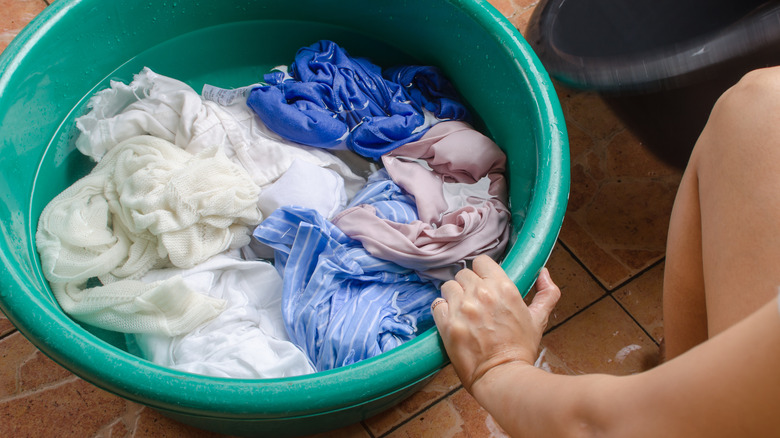This Common Kitchen Ingredient Might Save Your Clothes From Gasoline Smells
If you've accidentally spilled gasoline on your clothes, the overwhelming odor can be enough to give you a headache. Fortunately, you may be able to remove the smell with a kitchen staple you probably already have on hand: vinegar.
As one of the most multipurpose cleaning tools in your pantry, vinegar is a cleaning superstar thanks to the fact that its acetic acid can cut through grease and grime like no one's business. But vinegar isn't just a versatile cleaning tool for keeping your kitchen and bathroom clean; it's also considered a staple in the laundry room. Using vinegar in your laundry can help make your dingy whites look brighter, your clothes feel softer, and can also banish the stench from those particularly malodorous articles of clothing — including the ones that have been tainted by gasoline. Here's how you can use the power of vinegar to remove strong gasoline odors from clothing.
How to use vinegar to get rid of gasoline smells from clothing
Using vinegar to get rid of pungent gasoline smells is simple. First, create a concoction of 1 part distilled white vinegar and 1 part hot water (the hotter, the better). After blotting up any excess gasoline, take the offending article of clothing and let it soak in the solution for up to an hour. (If you have baking soda on hand, you may want to try applying it to the stain before the vinegar bath and let it sit for a few minutes for an added boost.)
Before dunking your clothes, you will first want to check and make sure that you aren't dealing with a fabric that's too delicate for a vinegar bath. If it's your spandex workout leggings, for example, the elastic in the material can deteriorate when soaked in vinegar so keep that in mind.
After you've soaked your clothing, you can go ahead and start the washing process. Some state that hand washing is the best method, while others suggest throwing the gasoline-ridden article of clothing into the washing machine by itself. Proceed with caution when drying though, as it's recommended you air-dry only, in order to prevent potential fires from any residual gas.

